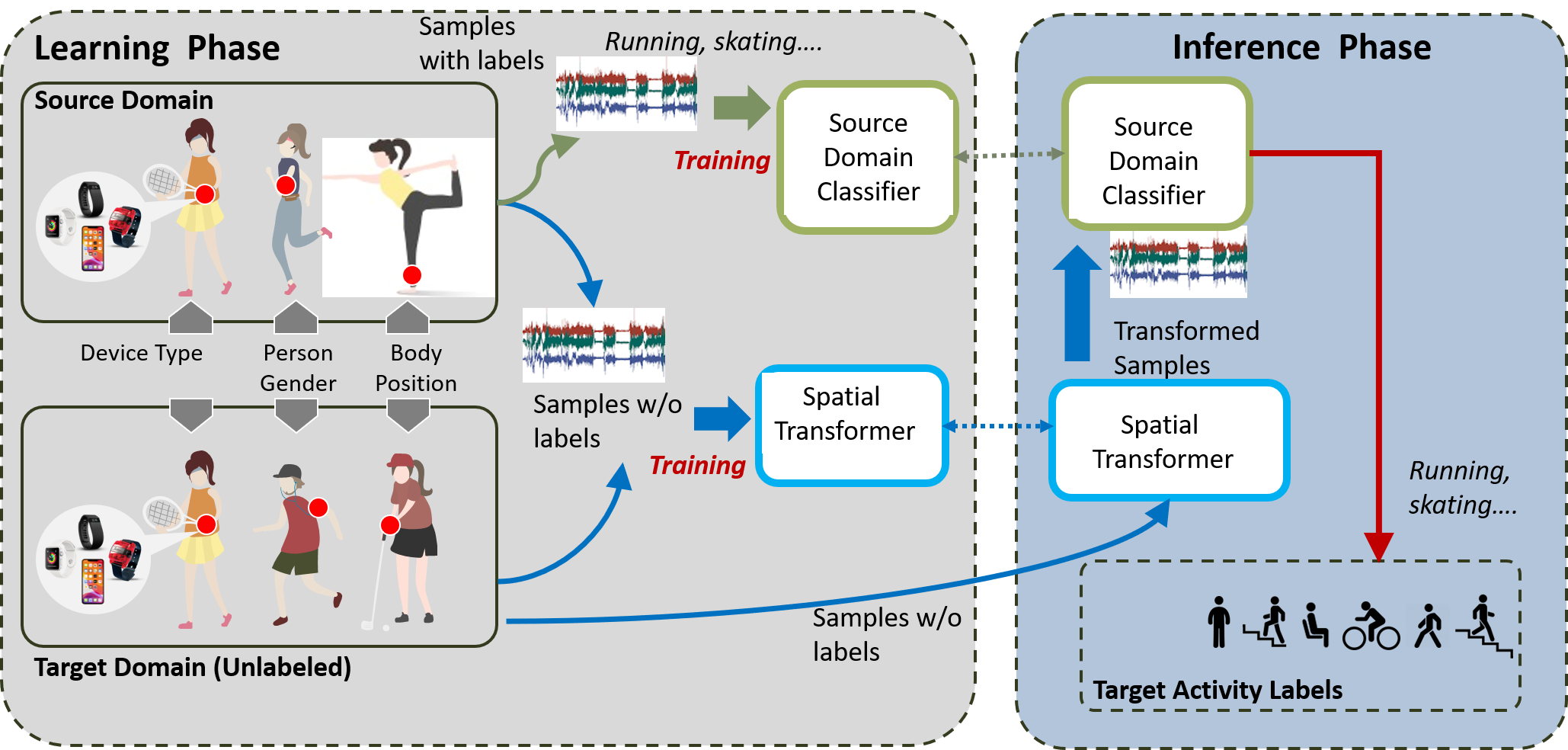This repository provides PyTorch implementation of the following IEEE/ACM CHASE 2021 paper:
We tackle the problem of domain adaptation for inertial sensing-based human activity recognition (HAR) applications -i.e., in developing mechanisms that allow a classifier trained on sensor samples collected under a certain narrow context to continue to achieve high activity recognition accuracy even when applied to other contexts. This is a problem of high practical importance as the current requirement of labeled training data for adapting such classifiers to every new individual, device, or on-body location is a major roadblock to community-scale adoption of HAR-based applications. We particularly investigate the possibility of ensuring robust classifier operation, without requiring any new labeled training data, under changes to
- the individual performing the activity, and
- the on-body position where the sensor-embedded mobile or wearable device is placed.
We propose STranGAN, a framework that explicitly decouples the domain adaptation functionality from the classification model by learning and applying a set of optimal spatial affine transformations on the target domain inertial sensor data stream by employing adversarial learning, which only requires collecting raw data samples (but no accompanying activity labels) from both source and target domains. STranGAN’s uniqueness lies in its ability to perform practically useful adaptation
- without any labeled training data and without requiring paired, synchronized generation of source and target domain samples, and
- without requiring any changes to a pre-trained HAR classifier.
Empirical results using three publicly available benchmark datasets indicate that STranGAN
- is particularly effective in handling on-body position heterogeneity (achieving a 5% improvement in classification F1 score compared to state-of-the-art baselines),
- offers competitive performance for handling cross-individual variations, and
- the affine transformation parameters can be analyzed to gain interpretable insights on the domain heterogeneity.
This repo was tested with Ubuntu 20.04, Python 3.8.10, PyTorch 1.9.0+cu111, and CUDA 11.2
-
Clone this repo with:
git clone git@github.com:azmfaridee/strangan-chase-2021.git cd strangan-chase-2021.git -
Optional: you can consider setting up a docker environment. Here is a nice set of scripts on getting started with the same ML environment we used with docker. Alternatively, you can setup your own
condaorVirtualenv. -
Install packages:
pip3 install -r requirements.txt
Here is a simple example of how to use STranGAN to perform domain adaptation on OPPORTUNITY dataset.
PREFIX='/workspace/phd/strangan-chase-2021/src'
DATA_PATH='/workspace/phd/strangan/data/preprocessed/opportunity_all_users.npz'
SAVE_PREFIX='/tmp/strangan-runs/'
RUN_ID='2'
SAVE_DIR=$SAVE_PREFIX$RUN_ID
python $PREFIX/strangan.py -d $DATA_PATH \
-ss 'S1,S2' \
-st 'S3,S4' \
-ps 'LUA' \
-pt 'BACK' \
-ch 3 \
-cls 4 \
-bs 32 \
--n_epochs 3 \
--gan_epochs 10 \
--gpu 0 \
--lr_FC 0.002 --lr_FC_b1 0.9 --lr_FC_b2 0.999 \
--lr_FD 0.0002 \
--lr_G 0.00002 --lr_G_b1 0.5 --lr_G_b2 0.999 \
--gamma 0.9 \
--save_dir $SAVE_DIR \
--log_interval 50 \
--eval_interval 500You will need to pre-process the raw IMU data with imputation of missing values, filtering and sliding window based
segmentation. Please refer to the documentation of ActivityDataset in src/dataset.py for more details on the shape
of the input matrix.
If you find this repository useful in your research, please consider citing our paper
@article{FARIDEE2021100226,
title = {STranGAN: Adversarially-learnt Spatial Transformer for scalable human activity recognition},
journal = {Smart Health},
pages = {100226},
year = {2021},
issn = {2352-6483},
doi = {https://doi.org/10.1016/j.smhl.2021.100226},
url = {https://www.sciencedirect.com/science/article/pii/S2352648321000477},
author = {Abu Zaher Md Faridee and Avijoy Chakma and Archan Misra and Nirmalya Roy},
keywords = {Domain adaptation, Wearable sensing, Learnable data augmentation, Adversarial learning, Generative modeling},
}
If you have any questions, please feel free to reach out over email via faridee1@umbc.edu
This research is supported by NSF CAREER grant 1750936, U.S. Army grant W911NF2120076, ONR grant N00014-18-1-2462, and
Alzheimer’s Association grant AARG-17-533039.
